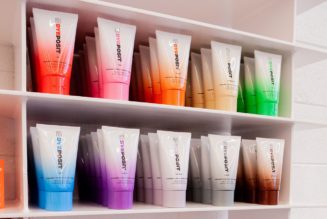Operating in a genre dominated by men, it’s two women who are propelling the engine of freeform electronic music from behind the scenes.
Chloe Suit and Emily Mitchell helm Wakaan as its Marketing Director and Merchandise Director, respectively. Wakaan was launched in 2015 by famed bass music producer and entrepreneur Liquid Stranger, or Martin Stääf, who has since grown the organization into a powerhouse record label and music festival proprietor.
And with two innovative, tough-as-nails women driving the brand, it has mutated from an unknown electronic neophyte into a global music and culture hub.
Sadly, Suit and Mitchell are outliers in their roles. A September 2019 survey conducted by the Association for Electronic Music (AFEM) to explore gender diversity issues in the industry showed that women are three times less likely (28%) than men to work at the executive level (71%) in their companies. That’s despite the fact that a higher percentage of the respondents with Master’s degrees were women.
Entrenched in leadership roles, Suit and Mitchell have worked diligently to establish Wakaan as a pathfinder in an archaic dance music industry that has always struggled to amplify the voices of women.
But Wakaan wasn’t always that way. Often associated with “wooks,” a subsection of dance music culture largely associated with men and frequently flamed for rampant drug use, Wakaan has at times struggled to distance from the negative stigmas of EDM.
Following the release of a phantasmagoric visualizer for a song called “Ketamine,” which incorporated overt drug-related motifs like magic mushrooms and spoons, Stääf issued a statement about purported substance references in music released by Wakaan. Condemning the use of narcotics, he used the statement to reinforce inclusivity as one of the pillars of his flagship label.
Inclusivity is not only embedded in Wakaan’s foundation, but also at the core of the brand’s marketing, Suit told EDM.com.
“Making sure the marketing is inclusive is important; that each piece of content we post can resonate with anyone,” she explained. “We strive to empower women and give them a safe and supportive platform through the labels and community we have built. Acknowledging the hard work and efforts of producers, vocalists, managers, marketing team members, agents… the list goes on.”
Mitchell has similar goals. In her efforts to entrench Wakaan as a bastion of women empowerment, she has developed clothing that she says allows women to realize and relish in their self-identity.
“WAKAAN’s merchandise empowers women by giving them a variety of items to choose from,” Mitchell said. “They’re able to pick from oversized garments to form-fitting items ranging from colorful to neutral. I try to create various styles of merch so each woman can pick something that expresses their inner-being and hopefully makes them feel amazing about themselves.”
“It’s all about what the person feels most comfortable in and how they choose to mix and match their favorite pieces,” Mitchell continued, adding that she’s currently working on a number of new summer pieces for women. “Whatever item of clothing a woman chooses to wear, they will rock it.”
But how can women navigate and feel comfortable in a scene that so often lets them down?
The documentary Underplayed explored that question with scathing brilliance, uncovering gender bias in the electronic dance music industry and denouncing it via intimate interviews with industry professionals. The film demonstrated that women face more barriers than their male counterparts due in part to a deeply rooted culture of sexism.
The obstacles of the film’s featured subjects naturally dovetail into the ones experienced by the women in the bass music world, where Wakaan operates. The scourge of that scene is not only the marginalization of its women artists, but also the blatant dearth of them.
And the freeform electronic genre—a niche of wonky, woozy bass music that Wakaan helped usher in—is an even more vacant space. There seems to be a glass ceiling for the women who try their hand at freeform production, struggling to advance their careers beyond the fleeting satisfaction of a few thousand—and usually penniless—SoundCloud streams.
With Mitchell and Suit at the controls of Wakaan’s public image, the brand is on a mission to lift up those women. Artists such as VEIL, NotLö, and Lucii—the latter of whom was named to EDM.com‘s Class of 2021—have had successful releases on the label recently and each have bright futures in electronic music. And they’re using Wakaan as a launchpad.
When asked how aspiring female artists can market themselves in a male-dominated space, Suit pointed to audacity as a core value. “Seize every opportunity you have,” she said. “You only miss the shots you don’t take, so they say.”
“Send music to other producers, labels, managers, friends, et cetera and get feedback on your work,” Suit continued. “Don’t be afraid to ask for help. Make sure you are active on social media and making your presence known as an aspiring producer. Be yourself and have your own brand.”
FOLLOW WAKAAN:
Facebook: facebook.com/WAKAANofficial
Twitter: twitter.com/WAKAANofficial
Instagram: instagram.com/wakaanofficial
Website: wakaan.com











